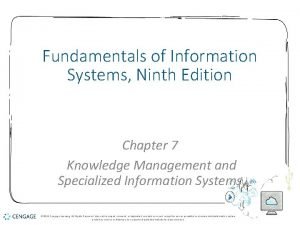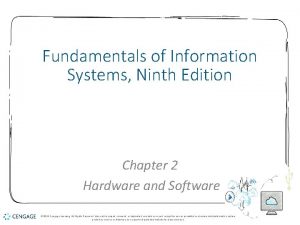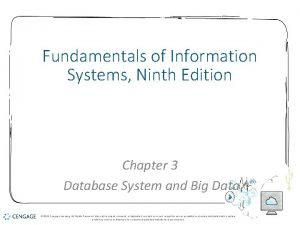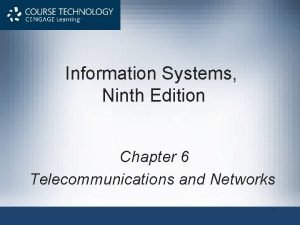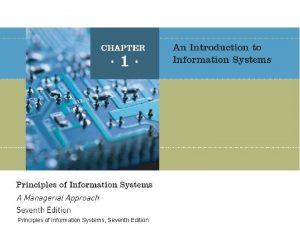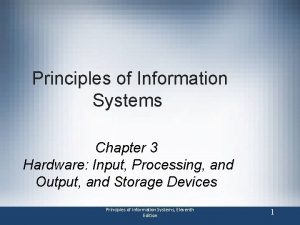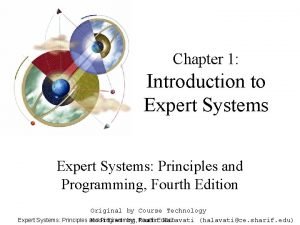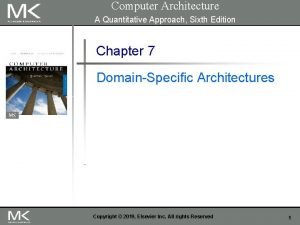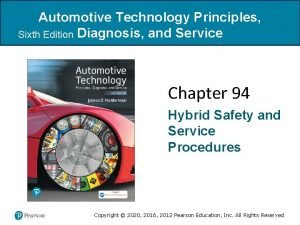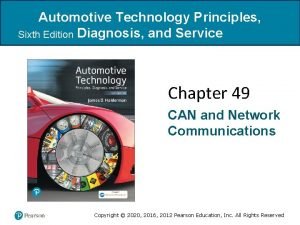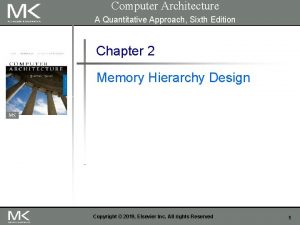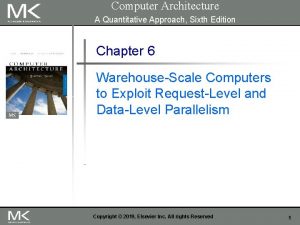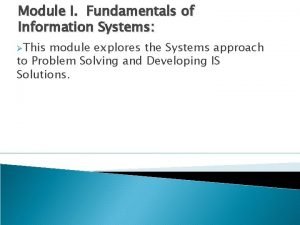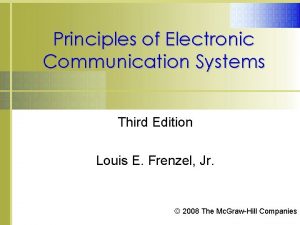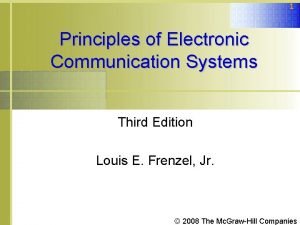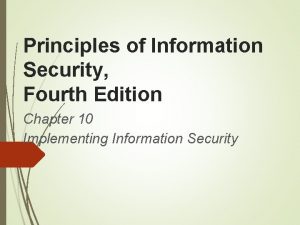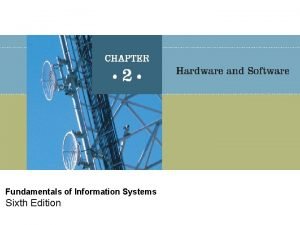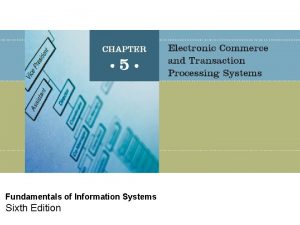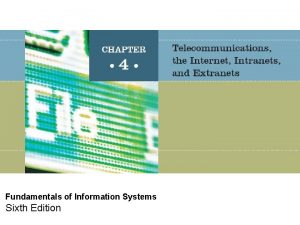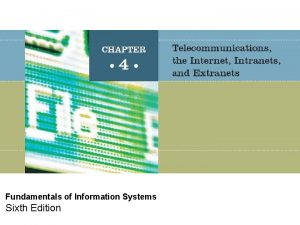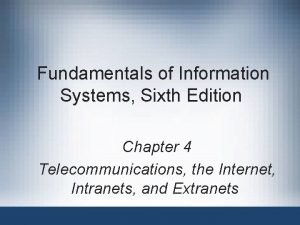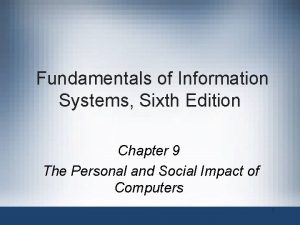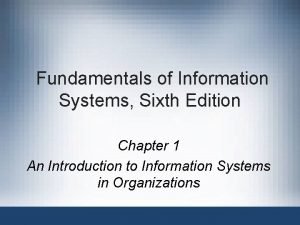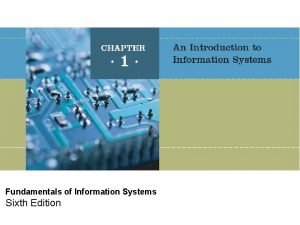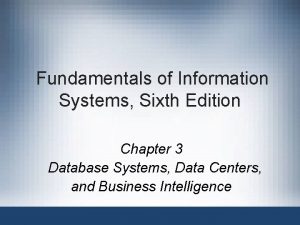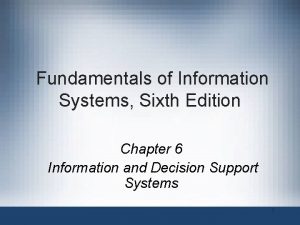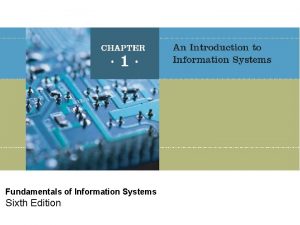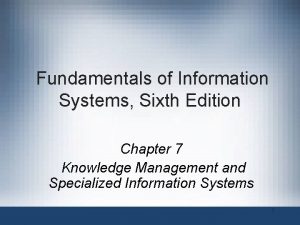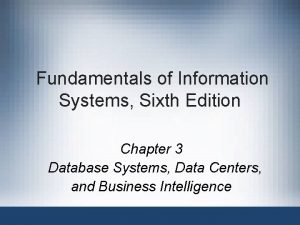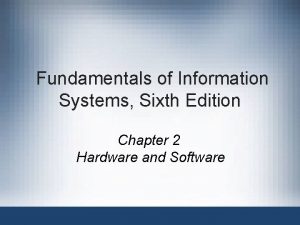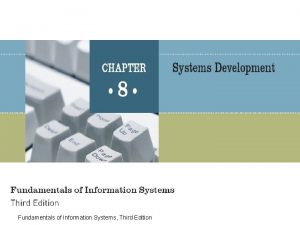Fundamentals of Information Systems Sixth Edition Principles and

























- Slides: 25

Fundamentals of Information Systems Sixth Edition

Principles and Learning Objectives • Artificial intelligence systems form a broad and diverse set of systems that can replicate human decision making for certain types of well-defined problems. – Define the term artificial intelligence and state the objective of developing artificial intelligence systems. – List the characteristics of intelligent behavior and compare the performance of natural and artificial intelligence systems for each of these characteristics. – Identify the major components of the artificial intelligence field and provide one example of each type of system. Principles of Information Systems, Sixth Edition. 2

Principles and Learning Objectives (continued) • Expert systems can enable a novice to perform at the level of an expert but must be developed and maintained very carefully. – List the characteristics and basic components of expert systems. – Identify at least three factors to consider in evaluating the development of an expert system. – Outline and briefly explain the steps for developing an expert system. – Identify the benefits associated with the use of expert systems. Principles of Information Systems, Sixth Edition. 3

Principles and Learning Objectives (continued) • Virtual reality systems have the potential to reshape the interface between people and information technology by offering new ways to communicate information, visualize processes, and express ideas creatively. – Define the term virtual reality and provide three examples of virtual reality applications. Principles of Information Systems, Sixth Edition. 4

Principles and Learning Objectives (continued) • Specialized systems can help organizations and individuals achieve their goals. – Discuss examples of specialized systems for organizational and individual use. Principles of Information Systems, Sixth Edition. 5

6. 1 An Overview of Artificial Intelligence • Artificial intelligence (AI): the ability of computers to mimic or duplicate the functions of the human brain. • Artificial intelligence systems: the people, procedures, hardware, software, data, and knowledge needed to develop computer systems and machines that demonstrate the characteristics of intelligence. Principles of Information Systems, Sixth Edition. 6

The Nature of Intelligence • Learn from experiences and apply knowledge acquired from experience. • Handle complex situations. • Solve problems when important information is missing. • Determine what is important. • React quickly and correctly to a new situation. • Understand visual images. • Process and manipulate symbols. • Be creative and imaginative. • Use heuristics. Principles of Information Systems, Sixth Edition. 7

Figure 6. 1: The Major Branches of Artificial Intelligence Principles of Information Systems, Sixth Edition. 8

Table 6. 2: A Comparison of Natural and Artificial Intelligence. Principles of Information Systems, Sixth Edition. 9

6. 3 Expert Systems • Hardware and software that stores knowledge and makes inferences, similar to a human expert. • Used in many business applications. Principles of Information Systems, Sixth Edition. 10

6. 3 Robotics • Mechanical or computer devices that perform tasks that either require a high degree of precision or are tedious or hazardous for humans. • Robots can be used in situations that are hazardous or inaccessible to humans. The Rover was a remotecontrolled robot used by NASA to explore the surface of Mars. • Contemporary robotics combines high-precision machine capabilities with sophisticated controlling software. • Many applications of robotics exist today. • Research into robots is continuing. Principles of Information Systems, Sixth Edition. 11

6. 4 Components of an Expert System Figure 6. 3: Components of an Expert System Principles of Information Systems, Sixth Edition. 12

The Inference Engine: • Seeks information and relationships from the knowledge base and provides answers, predictions, and suggestions the way a human expert would • Comparison of backward and forward chaining. The Knowledge Base • Stores all relevant information, data, rules, cases, and relationships used by the expert system. • Assembling human experts. Principles of Information Systems, Sixth Edition. 13

The Knowledge Acquisition Facility: • Provides convenient and efficient means of capturing and storing all the components of the knowledge base. • Acts as an interface between experts and the knowledge base. The Explanation Facility: • Allows a user or decision maker to understand how the expert system arrived at certain conclusions or results. • For example: it allows a doctor to find out the logic or rationale of the diagnosis made by a medical expert system. Principles of Information Systems, Sixth Edition. 14

The User Interface: • The main purpose of the User Interface is to make the development and use of an expert system easier for users and decision makers. Principles of Information Systems, Sixth Edition. 15

Applications of Expert Systems and Artificial Intelligence • • • Credit granting and loan analysis. Catching cheats and terrorists. Information management and retrieval. AI and expert systems embedded in products. Plant layout and manufacturing. Hospitals and medical facilities. Help desks and assistance. Employee performance evaluations. Virus detection. Shipping. Marketing. Principles of Information Systems, Sixth Edition. 16

6. 5 Vision Systems • The hardware and software that permit computers to capture, store, and manipulate visual images and pictures. • Used by the Justice Department to perform fingerprint analysis. • Used for identifying people based on facial features. Principles of Information Systems, Sixth Edition. 17

6. 6 Natural Language Processing • Processing that allows the computer to understand react to statements and commands made in a “natural” language, such as English. • Three levels of voice recognition: – Command: recognition of dozens to hundreds of words. – Discrete: recognition of dictated speech with pauses between words. – Continuous: recognition of natural speech. Principles of Information Systems, Sixth Edition. 18

6. 7 Learning Systems • A combination of software and hardware that allows the computer to change how it functions or reacts to situations based on feedback it receives • Learning systems software requires feedback on the results of actions or decisions • Feedback is used to alter what the system will do in the future Principles of Information Systems, Sixth Edition. 19

6. 8 Neural Networks • A computer system that can simulate the functioning of a human brain • The ability to retrieve information even if some of the neural nodes fail • Fast modification of stored data as a result of new information • The ability to discover relationships and trends in large databases • The ability to solve complex problems for which all the information is not present Principles of Information Systems, Sixth Edition. 20

Other Artificial Intelligence Applications • Genetic algorithm: an approach to solving large, complex problems in which a number of related operations or models change and evolve until the best one emerges • Intelligent agent: programs and a knowledge base used to perform a specific task for a person, a process, or another program Principles of Information Systems, Sixth Edition. 21

6. 9 Virtual Reality • Virtual reality system: enables one or more users to move and react in a computer-simulated environment. • Immersive virtual reality: user becomes fully immersed in an artificial, three-dimensional world that is completely generated by a computer. Principles of Information Systems, Sixth Edition. 22

Forms of Virtual Reality • Immersive virtual reality. • Mouse-controlled navigation through a threedimensional environment on a graphics monitor. • Stereo projection systems. • Stereo viewing from the monitor via stereo glasses. Principles of Information Systems, Sixth Edition. 23

Virtual Reality Applications • • Medicine. Education and training. Real estate marketing and tourism. Entertainment. Principles of Information Systems, Sixth Edition. 24

Self Examination Questions Short Answer Questions (3 marks) 1) What is AI? List out any FOUR characteristics of the Nature of Intelligence. 2) FIVE comparisons of Natural Intelligence (Human) and Artificial Intelligence(AI). 3) What is Virtual Reality and its applications? Long Answer Questions (5 marks) 4) What is an Expert system? Describe the components of an Expert system. 5) List out any FIVE applications of Expert systems. 6) Write short notes on: (a)Robotics (b)Vision systems (c)Natural Language Processing (d)Neural networks Principles of Information Systems, Sixth Edition. 25
 Fundamentals of information systems 9th edition
Fundamentals of information systems 9th edition Fundamentals of information systems 9th edition
Fundamentals of information systems 9th edition Fundamentals of information systems
Fundamentals of information systems Fundamentals of information systems 9th edition
Fundamentals of information systems 9th edition Rational people think at the margin
Rational people think at the margin Principles of business information systems
Principles of business information systems Principles of information systems 11th edition
Principles of information systems 11th edition Inicum
Inicum The sixth sick sheik's sixth sheep's sick lyrics
The sixth sick sheik's sixth sheep's sick lyrics Biochemistry sixth edition 2007 w.h. freeman and company
Biochemistry sixth edition 2007 w.h. freeman and company Expert systems: principles and programming, fourth edition
Expert systems: principles and programming, fourth edition Computer architecture a quantitative approach sixth edition
Computer architecture a quantitative approach sixth edition Automotive technology principles diagnosis and service
Automotive technology principles diagnosis and service Automotive technology sixth edition
Automotive technology sixth edition Apa sixth edition
Apa sixth edition Computer architecture a quantitative approach 6th
Computer architecture a quantitative approach 6th Precalculus sixth edition
Precalculus sixth edition Computer architecture a quantitative approach sixth edition
Computer architecture a quantitative approach sixth edition Fundamentals of information systems chapter 1
Fundamentals of information systems chapter 1 Introduction to information systems 6th edition
Introduction to information systems 6th edition Principles of electronic communication systems 3rd edition
Principles of electronic communication systems 3rd edition Principles of electronic communication systems 3rd edition
Principles of electronic communication systems 3rd edition Failure of supporting utilities and structural collapse
Failure of supporting utilities and structural collapse Principles of information security 4th edition
Principles of information security 4th edition Principles of information security 4th edition
Principles of information security 4th edition Principles of information security 4th edition
Principles of information security 4th edition
